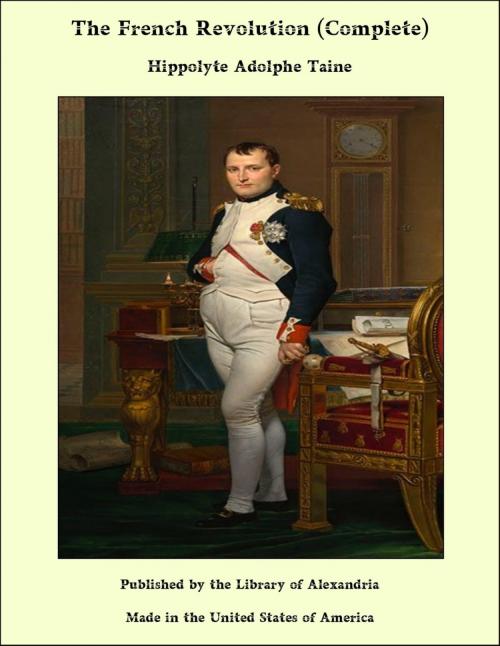The French Revolution (Complete)
Nonfiction, Religion & Spirituality, New Age, History, Fiction & Literature| Author: | Hippolyte Adolphe Taine | ISBN: | 9781465553911 |
| Publisher: | Library of Alexandria | Publication: | March 8, 2015 |
| Imprint: | Language: | English |
| Author: | Hippolyte Adolphe Taine |
| ISBN: | 9781465553911 |
| Publisher: | Library of Alexandria |
| Publication: | March 8, 2015 |
| Imprint: | |
| Language: | English |
During the night of July 14-15, 1789, the Duc de la Rochefoucauld-Liancourt caused Louis XVI to be aroused to inform him of the taking of the Bastille. "It is a revolt, then?" exclaimed the King. "Sire!" replied the Duke; "it is a revolution!" The event was even more serious. Not only had power slipped from the hands of the King, but also it had not fallen into those of the Assembly. It now lay on the ground, ready to the hands of the unchained populace, the violent and over-excited crowd, the mobs, which picked it up like some weapon that had been thrown away in the street. In fact, there was no longer any government; the artificial structure of human society was giving way entirely; things were returning to a state of nature. This was not a revolution, but a dissolution. Two causes excite and maintain the universal upheaval. The first one is food shortages and dearth, which being constant, lasting for ten years, and aggravated by the very disturbances which it excites, bids fair to inflame the popular passions to madness, and change the whole course of the Revolution into a series of spasmodic stumbles. When a stream is brimful, a slight rise suffices to cause an overflow. So was it with the extreme distress of the eighteenth century. A poor man, who finds it difficult to live when bread is cheap, sees death staring him in the face when it is dear. In this state of suffering the animal instinct revolts, and the universal obedience which constitutes public peace depends on a degree more or less of dryness or damp, heat or cold. In 1788, a year of severe drought, the crops had been poor. In addition to this, on the eve of the harvest, a terrible hail-storm burst over the region around Paris, from Normandy to Champagne, devastating sixty leagues of the most fertile territory, and causing damage to the amount of one hundred millions of francs. Winter came on, the severest that had been seen since 1709. At the close of December the Seine was frozen over from Paris to Havre, while the thermometer stood at 180 below zero. A third of the olive-trees died in Provence, and the rest suffered to such an extent that they were considered incapable of bearing fruit for two years to come. The same disaster befell Languedoc. In Vivarais, and in the Cevennes, whole forests of chestnuts had perished, along with all the grain and grass crops on the uplands. On the plain the Rhone remained in a state of overflow for two months.
During the night of July 14-15, 1789, the Duc de la Rochefoucauld-Liancourt caused Louis XVI to be aroused to inform him of the taking of the Bastille. "It is a revolt, then?" exclaimed the King. "Sire!" replied the Duke; "it is a revolution!" The event was even more serious. Not only had power slipped from the hands of the King, but also it had not fallen into those of the Assembly. It now lay on the ground, ready to the hands of the unchained populace, the violent and over-excited crowd, the mobs, which picked it up like some weapon that had been thrown away in the street. In fact, there was no longer any government; the artificial structure of human society was giving way entirely; things were returning to a state of nature. This was not a revolution, but a dissolution. Two causes excite and maintain the universal upheaval. The first one is food shortages and dearth, which being constant, lasting for ten years, and aggravated by the very disturbances which it excites, bids fair to inflame the popular passions to madness, and change the whole course of the Revolution into a series of spasmodic stumbles. When a stream is brimful, a slight rise suffices to cause an overflow. So was it with the extreme distress of the eighteenth century. A poor man, who finds it difficult to live when bread is cheap, sees death staring him in the face when it is dear. In this state of suffering the animal instinct revolts, and the universal obedience which constitutes public peace depends on a degree more or less of dryness or damp, heat or cold. In 1788, a year of severe drought, the crops had been poor. In addition to this, on the eve of the harvest, a terrible hail-storm burst over the region around Paris, from Normandy to Champagne, devastating sixty leagues of the most fertile territory, and causing damage to the amount of one hundred millions of francs. Winter came on, the severest that had been seen since 1709. At the close of December the Seine was frozen over from Paris to Havre, while the thermometer stood at 180 below zero. A third of the olive-trees died in Provence, and the rest suffered to such an extent that they were considered incapable of bearing fruit for two years to come. The same disaster befell Languedoc. In Vivarais, and in the Cevennes, whole forests of chestnuts had perished, along with all the grain and grass crops on the uplands. On the plain the Rhone remained in a state of overflow for two months.















